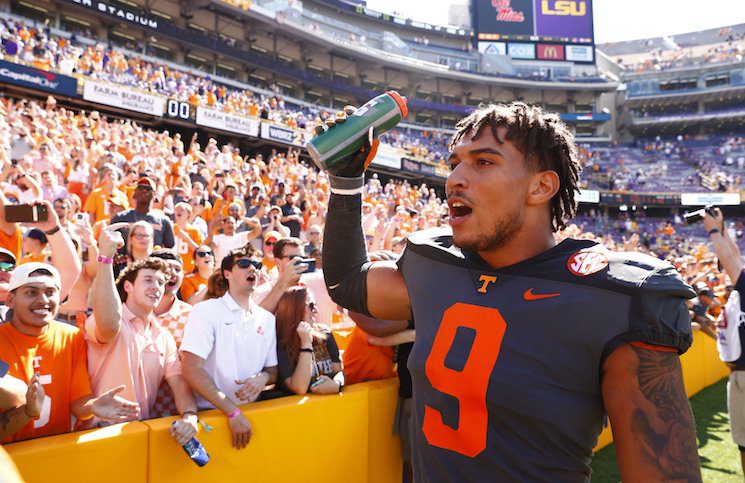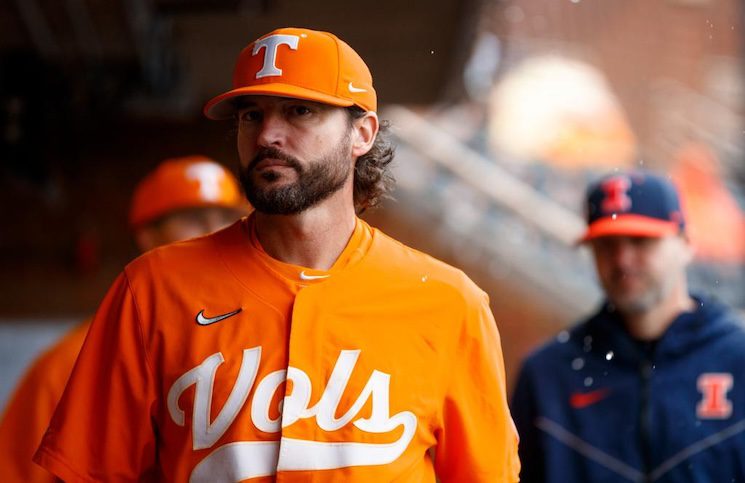
Think back a year and a half ago. Tennessee had just capped off a surprisingly strong 2017-18 season where they won a share of the SEC regular season title, made it to the SEC Tournament Finals, and earned a berth in the NCAA Tournament for the first time since 2014. A big reason why the Vols had that success was the emergence of Lamonte Turner as a legitimate scoring threat.
Turner was named the SEC Co-Sixth Man of the Year for the 2017-18 season after averaging 10.9 points per game in 35 games as the Vols’ main bench player. He led the entire team in three-pointers made (70) and was third on the team in scoring average. Not only that, but he also averaged 3.2 rebounds and 2.2 assists a game.
The future seemed exceptionally bright for Turner, who had already shown a knack for hitting clutch shots and connected on 39.5 percent of his threes as a redshirt sophomore.
But life had a different plan.
Turner had to undergo shoulder surgery in the offseason after that breakout redshirt sophomore campaign, and it drastically affected his play to begin the 2018-19 season. Turner sat out the Vols’ first three games of the season, and when he finally took the court, he wasn’t himself.
In his first three games of the season, Turner played in 23.7 minutes a game and shot just 26.5 percent from the floor, including just 20 percent from three. It was obvious that Turner’s shoulder was causing him problems, and he and head coach Rick Barnes decided the best course of action was for Turner to sit the bench for a month-plus.
Turner didn’t play again until Tennessee entered SEC play on January 5th, and after a rusty first game against Georgia, the redshirt junior finally showed flashes of his former self, nailing three of his four three-pointers in UT’s win over Missouri.
From then till Tennessee’s road game against Kentucky on February 16th, Turner was playing more like his old self, and he had assumed a starting role as the Vols’ two-guard alongside Jordan Bone.
Then, Turner’s shoulder problems flared up again, and he went through an extended cold streak from three.
Turner missed all seven of his threes in Tennessee’s road loss to Kentucky, and he would go a combined 4-for-42 from three from that game through the rest of the regular season. It wasn’t until the Vols entered the SEC Tournament that Turner finally started hitting shots again, connecting on five of his 11 three-pointers in that tournament (including the game-winner against Kentucky) and making eight of his 22 threes in the NCAA Tournament.
But Turner, again, had to have surgery during the offseason this past summer, operating on his left shoulder. This time, the recovery didn’t go smoothly at all.
The Vols needed Turner to step up into an even larger role this season after the departure of starting point guard Jordan Bone along with Grant Williams, Admiral Schofield, and Kyle Alexander. And Turner seemed to be adjusting well to his new role as the Vols’ lead distributor, totaling 46 assists in UT’s first five games.
One thing that wasn’t looking good was Turner’s shot, though.
While he was averaging 13.6 points a game through the first five games of the season, Turner was getting there very inefficiently. He was only making 30 percent of his field goals, and he had only made seven of his 28 three-pointers (25 percent).
It only got worse, though, and the pain wasn’t getting any better or any more manageable for the Vols’ veteran guard.
Last week, Turner made a trip to St. Louis to see a specialist about his shoulder. He received a shot that would hopefully alleviate some of his pain and help put off any type of surgery.
Unfortunately for Turner, it didn’t seem to help.
While staying efficient from the free throw line, Turner’s ability to make shots outside of that worsened over the last week. In three games over the last seven days, Turner made just eight of his 25 field goals and failed to connect on any of his six three-pointers.

After Tennessee’s 75-53 win over Jacksonville State on Saturday, Turner revealed that he would not be suiting up for the Vols again in his collegiate career.
“I played my last game as a Vol tonight,” Turner said following the game. “A lot of people know I’ve been battling injury. We haven’t know what’s wrong, or what’s going on, but as of two weeks ago we finally figured out that I have thoracic outlet syndrome.
“It’s the same injury that Markelle Fultz (Orlando Magic point guard) dealt with. The only difference is mine is in my left shoulder, not my shooting shoulder, so, it’s not as bad. We’ve been doing therapy the last two or three weeks. I got a shot in my chest, my muscles to try and fix it, but it didn’t really help.”
And with that declaration, Turner’s career at Tennessee came to an end. He finished his career with 1,086 points, placing him 46th in UT history. His 347 assists are the 12th-most in a UT career, and his 171 three-pointers made are tied with Greg Bell for the 10th-most in a Tennessee career.
Not bad numbers. But Turner deserved so much more.
Turner is without a doubt one of the most physically and mentally tough players to ever don the orange and white. I know in my short time covering Tennessee athletics (since 2014), he’s arguably the toughest basketball player I’ve seen at UT. Not only that, but his game looked so unbelievably promising after his redshirt sophomore season. Turner looked like the next great three-point shooter for Tennessee, and by all accounts he should’ve been.
But that’s not how it all played out.
You never heard Turner complain about the pain. You never heard him make excuses. You never heard him do or say anything that wasn’t all about his teammates. He deserved a long, uncomplicated career with the Vols.
Instead, his last two years have been marred by injury, and his career is coming to an abrupt end.
When I remember the play of Lamonte Turner, I’ll think of the clutch threes he hit against Kentucky, his versatility and adaptability, and the swagger he carried himself with and the way he helped lead the Vols down in their tournament run in 2019. Unfortunately, I’ll also think of how a rare and complicated shoulder injury kept him from reaching his full potential.
Turner deserved to go down as one of the Vols’ greatest three-point specialists in school history. He deserved for this season to be remembered as the year he adapted to a new role and flourished in it. He was already less than 30 assists away from his career-high in just 11 games this season, and his 7.1 assists per game was one of the highest averages in the country.
How Tennessee responds to Turner’s sudden departure will define the season. But I’m more interested in how Turner responds and what he makes out of this situation.
Turner graduated with a degree in Communication Studies in May and is enrolled in graduate-level courses now. He has a degree, and Rick Barnes said in a statement on Saturday that he and the entire program will support him in whatever comes next.
It remains to be seen if Turner can or will play basketball again at a professional level after this surgery. Even if he doesn’t, he’s the type of young man who has a bright future ahead of him off the court. Turner is well-spoken, intelligent, and he has the right attitude to thrive in whatever he does.
There are so many “what ifs” and “if onlys” in Tennessee sports history, especially over the last decade. Turner will go down as yet another, unfortunately.
And he deserved so much better.




